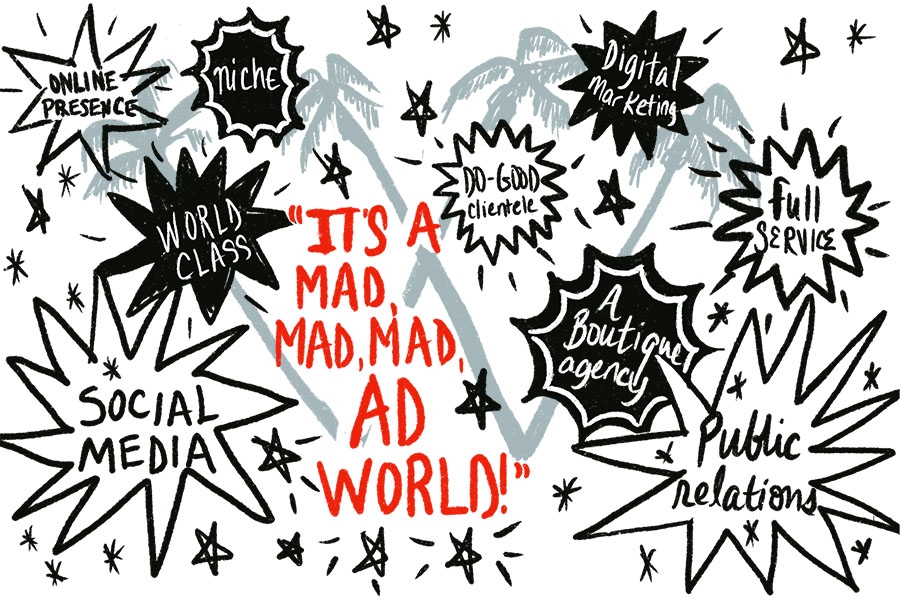Marketing and advertising firms hone their brands to compete in Portland’s saturated agency market.
“It is the most competitive agency landscape I have seen in 40 years,” says Doug Fish, a veteran professional of the marketing and advertising sector, and founder of Fish Marketing in Portland.
It is a common refrain from folks who work in advertising. They have never seen as many agencies competing in the Portland market. Three hundred and fifty ad agencies operate in the area, compared with 200 a decade ago. And the market keeps growing.
Wieden+Kennedy is the biggest competitor by employee count. But smaller newcomers are popping up and larger firms are expanding.
CMD recently gained independence from its former parent, door and window maker Jeld-Wen, and is seeking to expand. Logical Position, a digital marketing agency, is hiring hundreds of people and moved into a new office to accomodate its growing workforce.
The city’s hub for creative talent is great for businesses seeking to improve their brands. But it is a tough market to compete in if you are an ad agency. Firms have to work extra hard to stand out from the crowd, and some are looking inward to define and hone their own brands.
Grady Britton is one such firm. Paige Campbell, president, and business partner Andy Askren bought the company from founders Cherry Britton and Frank Grady in 2009. It was in the depths of the 2008 recession, and the new owners admit it took a while for them to feel comfortable running the business.
“The previous owners had owned the company for 27 years. We were not confident stepping into their shoes. We did not know what that meant to make a company our own,” says Campbell.
It was hard going getting through the recession — employees took pay cuts and there were layoffs. But fast-forward 10 years and the full-service agency has more than doubled its staff to 33 and is facing the most competitive market Campbell has ever seen.
“A lot of talent comes here,” she says, adding many marketing professionals stay on in the city after working for the likes of Nike and Wieden+Kennedy. Some launch their own agencies.
“The work coming out of Portland is world-class. There are a lot of mid to small agencies that make it really competitive for the number of businesses that are here.”
To compete effectively, Campbell and Askren asked themselves the existential question of why they were in business. The answer, honed over drinks at a local bar, was that they wanted to service clients who “do right by the world.”
The agency became B-Corp-certified to cement its identity as a company rooted in corporate social responsibility. Those values are applied to the clients the company chooses to work with. And in turn, that resulted in turning down businesses that do not fit the bill.
“We got clear what our values are for the organization and our clients,” says Campbell.
While Grady Britton is a full-service agency, other firms have chosen to specialize to compete.
Michael Weinhouse started Logical Position 10 years ago — also during the recession. Weinhouse says it was a good time to start the firm because market conditions “could only improve.”
The agency focuses on digital marketing campaigns that allow clients to track how their marketing platforms are performing. Weinhouse saw a gap in the advertising market for offering clients transparency into how their money is being spent.
The company targeted small and midsize companies at first, but is now serving larger enterprises. It opened satellite offices in the Midwest and on the East Coast to broaden its reach.
The CEO says fostering a workplace culture that resonates with employees is important to its success. An employee-led committee organizes volunteering activities, company outings and educational seminars.
It also does not choose to hire people who have a lot of experience in marketing. “We hire college grads and train them. They could have a background in coding, for example. We are looking for intelligent and driven people who ask the right questions,” says Weinhouse.
As the economy slows — and there are indications an economic decline is in the cards in the coming years — the glut of agencies in Portland will start to taper off. Agencies that are full service (in other words, providing a variety of services, including public relations) think they are best positioned to weather a downturn.
Nate Parr, who helped found Fish Marketing with Doug Fish 17 years ago and recently took over as president of the firm, has noticed the plethora of specialist and boutique agencies that have made the marketing and advertising market extra competitive.
The full-service agency works with smaller brands, half of which are not local to Oregon. It targets outdoor brands and has clients in Utah, Colorado and even as far away as Hawaii. The company considered opening satellite offices to compete better but decided that advances in digital communication made that idea obsolete.
Parr says the firm’s full-service model ensures a greater chance of longevity when the economy goes into decline. Advertising budgets are the first to get cut when the economy slides, he points out.
“We grow with brands. It allows us to weather the changing cycles,” he says.
To subscribe to Oregon Business, click here.








